'Taking my last breath on the ice.' An ending for Olympian Johnny Weir, and a beginning
- Oops!Something went wrong.Please try again later.
Johnny Weir already knows how it will go.
He'll be skating in front of a packed audience at the Skating Club of Wilmington to "Clair de Lune," the lilting third movement composed in 1890 by Claude Debussy, and it will hit him just like it always does.
Play the music as you read Weir's story
The music, for Weir's final performance in the United States on March 31 and April 1, will represent the arc of his journey from his first skate on an iced-over cornfield near his childhood home in Quarryville, Pennsylvania, to lessons at the University of Delaware, to worldwide travel for figure skating competitions, including two Olympics.
The skater, self-described as "mushy-gushy," knows he will cry during this final performance.
"There are certain nights when I'm so tired and I'm so at the end of my rope, and then the music comes on, and I just cry," he said. "It's just the end of an era in my life and the start of a new one."
The music in this final show will crush the Olympian who, at 38 years old, says, "I'm just old."
And it will lift him.
Figure skating made Weir into an icon around the world, both as someone known for his artistry in an era of what he calls "jumping machines," and for his flamboyance. No costume or outfit was too outlandish. No skating performance was too reserved.
"Clair de Lune," Weir said, encompasses the entire journey.
"And at the end, it just opens way up. It’s a crescendo."
It also serves as a bridge to his next chapter.
'Just like an angel'
In Weir's first number, he'll skate to Radiohead's "Creep." The version he'll use for the show is performed by a contestant on "Eurovision Song Contest" on Peacock, for which Weir is a host.
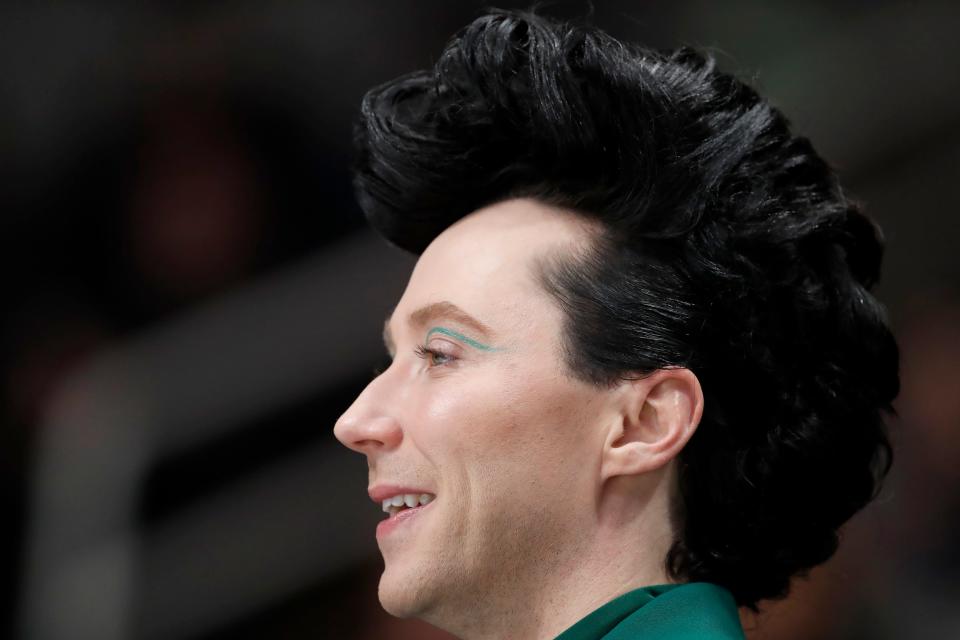
That, too, encapsulates Weir's career arc.
You're just like an angel
Your skin makes me cry
You float like a feather
In a beautiful world
—
I wish I was special
You're so (expletive) special
—
But I'm a creep
I'm a weirdo
What the hell am I doin' here?
I don't belong here
—
Well, yes, Weir belongs. In his own way.
He has carved out a career as a figure skating commentator on NBC with Tara Lipinski, another former national champion figure skater. He acts, appearing recently in an episode of the rebooted show from the 1980s "Night Court."
And Weir wants to open a skating academy once he finishes his summer tour in Japan.
But like everything else, the academy will be uniquely Weir, reflecting his vast experiences.
At age 12, he began competitive skating at the University of Delaware with coach Priscilla Hill. Weir won three straight U.S. Figure Skating Championships from 2004-06 and went to his first Olympic games in 2006.
Then he trained with Galina Zmievskaya, a renowned Russian coach, whom he credited with emphasizing his elegance and artistry on the ice as she prepared him for the 2010 Olympics in Vancouver.
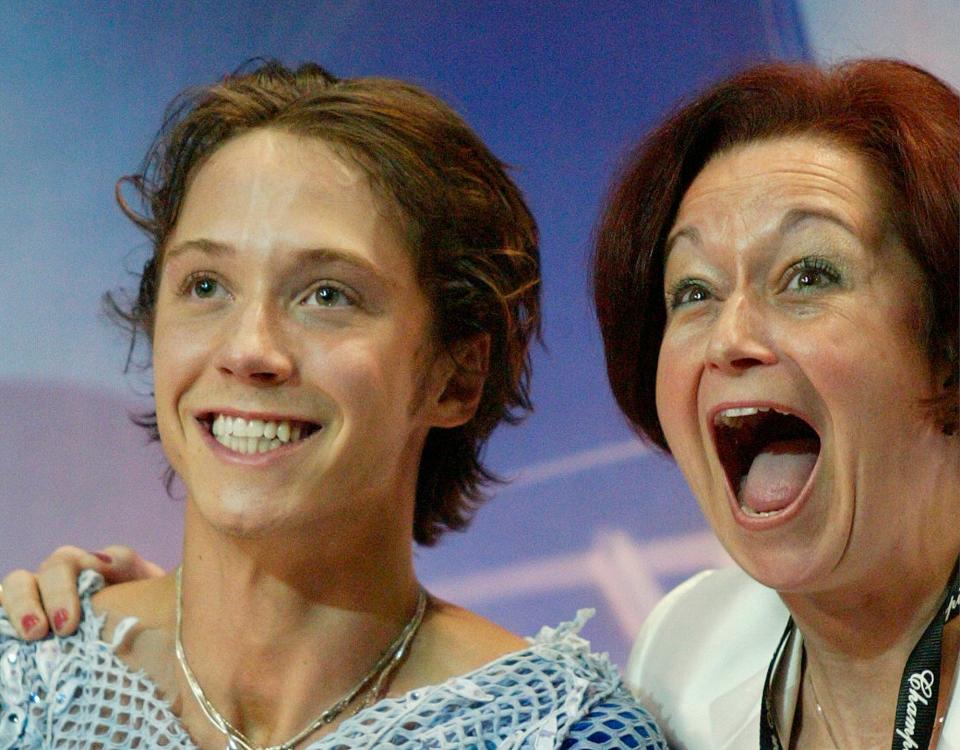
But really, Weir had that all along.
"He's like a painter. He has the ability to put on a canvas exactly what he's thinking," said Peter Bilous, the general manager of the Skating Club of Wilmington. Bilous has known Weir since he was a teenager, watching his progression into an Olympic figure skater known for his artistry.
"He's always been a great artist on the ice, but he was also very athletic. Then the artistry side just blossomed," he said.
Weir, drawn to Russia and Japan at a young age, became a cult hero in both countries. He saw how those skaters trained, then he incorporated their techniques into his own regimen. He also learned the value of learning in groups as opposed to one on one.
He wants to emulate that in his new life, helping young skaters.
"I want to create a very elite school that is competitive with the rest of the world and taking little things from around the world that I’ve learned, and hoping they make the skaters better," Weir said. "And, of course, helping young skaters not make the same mistakes that I made and certainly to have an atmosphere that is very supportive and full of teamwork."
What kind of mistakes?
"There was something very natural to skating for me," he said. "I could be a bit lazy at times. I could be a bit persnickety and not listen to my coaches at times because there were things that would come a lot easier to me than another skater that was on the ice with me.
"I definitely think my work ethic could have used some work, and that’s what I did later in my career, and working with the different coaches. They helped me learn what the work was about, and not just the fun of figure skating. ... I was very harsh with myself. And I want to instill in my students that it’s possible to achieve so much in this sporting world and that you can be kind to yourself at the same time."
Living for 'the quiet moments'
In that final moment on the ice this week, Weir will be thinking about his greatest achievement in figure skating. It happened at the Vancouver Olympics.
"When I look back, I see myself at center ice at my second Olympics in my final position having performed the performance of my life and having the world stand up for me, literally and figuratively," he said. "That’s the moment I always harken back to."
That night, he glided out to center ice, gathered himself, then slowly uncoiled to "Fallen Angel" as the music gracefully and gradually built. Weir built in unison with the music, landing all of his jumps and performing with his signature artistry.
The long program ended in a furious set of spins with the violin from the music roaring in rapid fire. Then everything stopped in an instant, and there was Weir, at center ice, on one knee, his heart pounding. Weir leaned all the way back before moving forward and grabbing his heart with one hand, his head looking straight down at the ice as tears streamed down his face.
The sold-out crowd gave him a standing ovation as Weir slowly rose and skated off, waving to the crowd with a sense of euphoria.
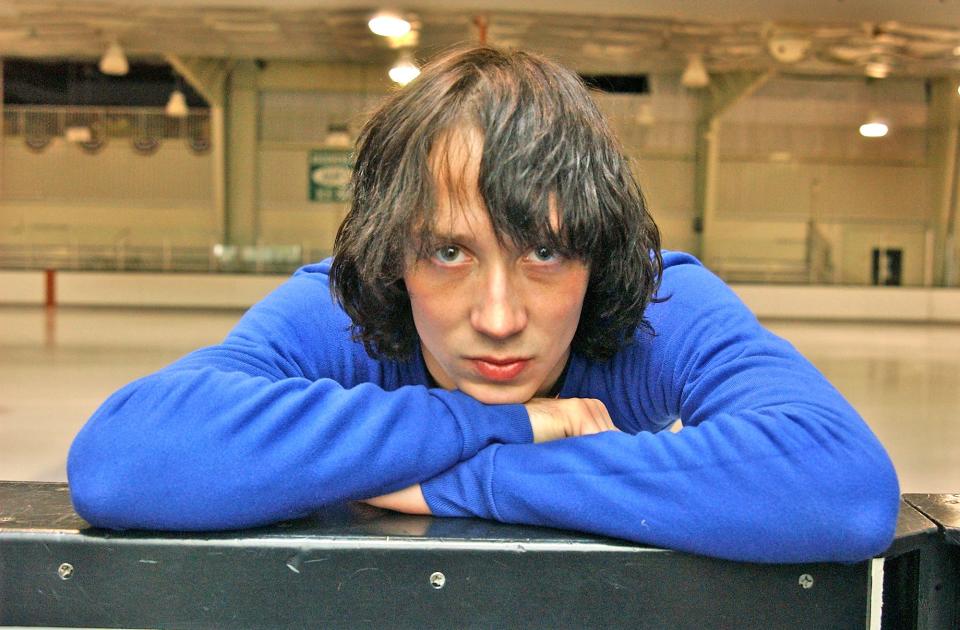
Weir finished sixth at the Olympics that year. To him, he won. It was his last Olympic event, and he gave his best performance.
That moment was the epitome of a long journey, of all the lessons to get to that world stage.
"It’s the quiet times," he said. "It’s the training with my first coach, Priscilla Hill, in Newark, or achieving a new skill that I’ve never done before and landing it on the practice ice, and every coach and every other skater applauds. It’s spending time training abroad with my second coach, Galina Zmievskaya, and the funny situations that happened to us. And some of the more adult conversations that we had to have to push me to become better than I was when I was young.
"It’s always those quiet moments of achieving something on a daily basis, more so than the ones that the rest of the world gets (to see). It’s those quiet moments that I’m nostalgic for."
Weir finds that peace living in pastoral and secluded Greenville, Delaware.
For Weir, it's an interesting juxtaposition. He has flown around the world, whether it's on assignment for NBC at a major figure skating event like at the World Figure Skating Championships in Japan − he's a fan favorite there − last week, or to California to work on an acting gig, or everywhere in between.
"I live on a piece of land that really has no neighbors except for one, and they’re a really quiet family," Weir said. "It’s helpful to me because my life is so elevated and so over the top, with the hair and the clothes and the makeup and the quips and the lines and the live TV and the ready-set-action sort of aspect of my life.
"It’s fast and it’s difficult, and it can be, in its own way, a very lonely way of life. The percentage of my life that I spend sitting alone on an airplane or in hotel rooms is pretty wild. But to balance that, I love the quiet of where I live."
So Delaware is where Weir achieves his "balance." He has his friends from growing up in Newark. But he also likes living here as his way to decompress when he's not as busy.
"It’s all about balance. Balance is key for me," he said. "That’s why I’ve been able to skate as long as I have. That’s how I’ve been able to be an entertainer for as long as I have. It’s just finding that way every day to take a big deep breath and enjoy the life that you’ve created for yourself."
But he also knows that it's time to stop skating.
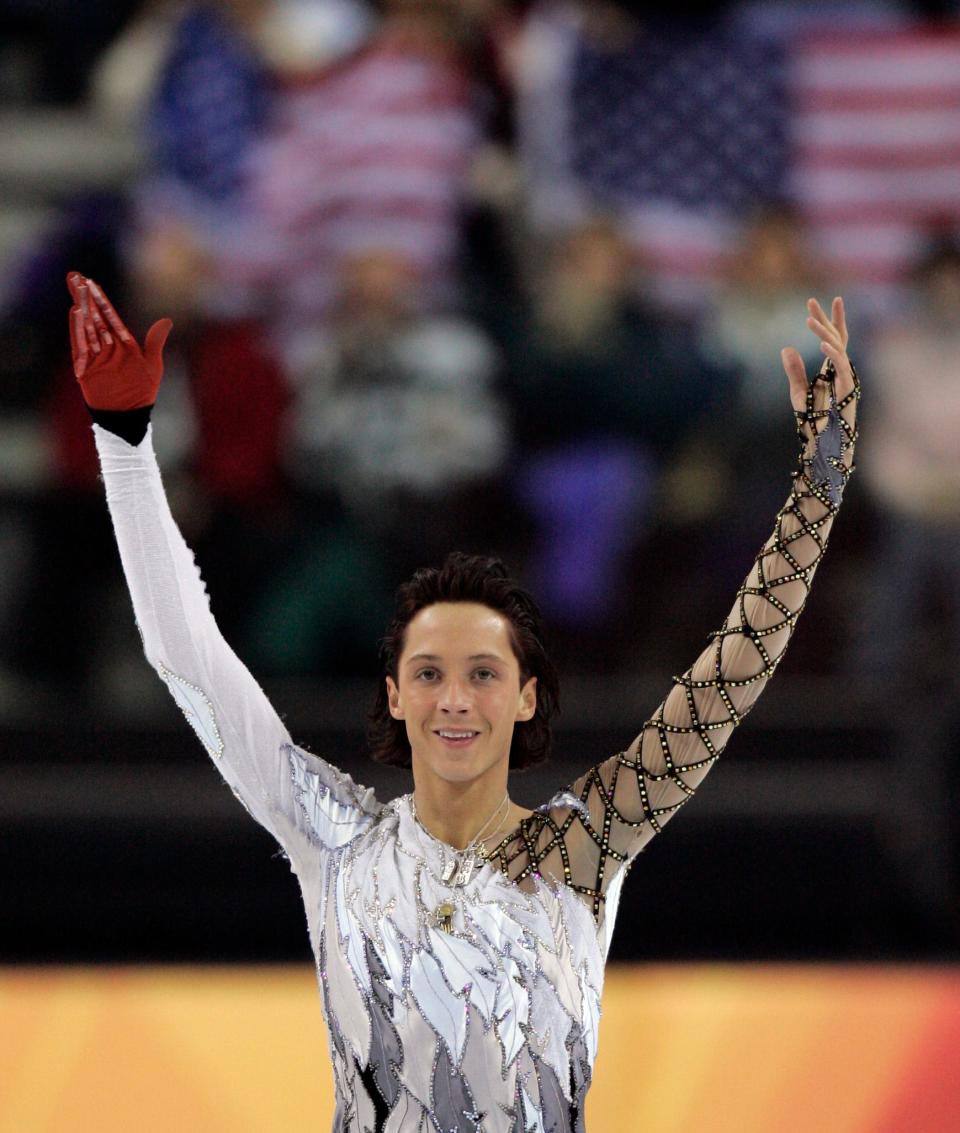
'Skating itself gets harder'
Weir actually wanted to retire from skating a few years ago, but then the pandemic hit in the spring of 2020. He couldn't skate or tour for about 10 months, as rinks closed up around the world. And Weir didn't want to go out without performing in front of his fans again in Japan and the United States.
So Weir put everything into training one last time for his final U.S. performance, followed in a few months by performances in Japan.
"As soon as I got home from touring last spring, I put my nose down, and I have not let myself take time away from the ice," Weir said. "I’ve kept everything up. I’m trying elements that I haven’t tried since before the pandemic, very difficult skating elements that most 38-year-olds can’t do. I’m trying to push myself. I’m skating multiple times a day at very different hours of the day, all the time.
"The skating itself gets harder as I’m getting closer and closer to 40 every day." I’m still trying to do things that I did when I was 12 years old."
Bilous has seen that, too.
Many skaters perform well into their 40s and 50s, even though their ability is not nearly what it was at their peak. But Weir couldn't be like that.
"He's a perfectionist," Bilous said. "You can see him get annoyed if he's not landing his jumps. ... I think Johnny recognizes, with all the other things in front of him, it would be difficult to devote the time to keep performing at the level that he demands of himself."
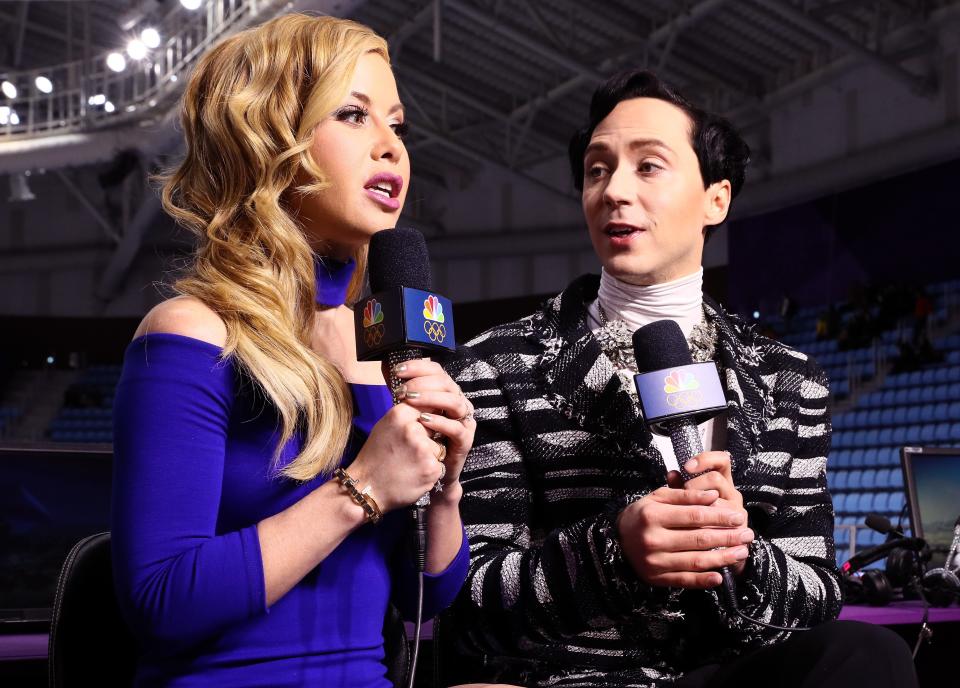
A bond with Tara Lipinski in skating, acting
And that leads back to life after skating.
Weir takes his professional life seriously. He might not be a natural actor, but he has dived into his roles, whether it was in a scene in the movie "Zoolander 2" that was edited out, or on his former Netflix series "Spinning Out," or on "Project Runway," "Dancing With the Stars," and most recently, during an episode of the "Night Court" reboot last month.
In one scene, Weir and Lipinski are sitting in the court trading barbs with the show's star, John Larroquette, who plays attorney Dan Fielding.
Fielding tells Weir and Lipinski, seated in the front of the gallery, that he has great respect for Olympic athletes.
"Your ability to work only once every four years is incredible," Fielding says to laughs. Lipinski then critiques Fielding's demeanor and wardrobe. Then she and Weir, in unison, exclaim: "We live for pageantry!"
Lipinski, in a recent interview with UPI, described the scene with Weir as "a heightened version of ourselves." She added it's because their authenticity shines through, just as it does when they're broadcasting at a figure skating competition.
Weir said he tries to bring that to everything he does.
"Whenever I go up for a part, of course, I’m up against people who have trained their entire lives to be an actor," Weir said. "So I don’t have huge dreams and aspirations of one day turning into Meryl Streep and winning 90 Oscar awards. But I have so much fun now that I’m out of the competitive skating world that I can try things.
"Even though I’m not great at them, I love giving myself the opportunity to try because when you’re training for the Olympics, that’s all you really have time to do, and failure is not an option. So whenever someone comes to me with some crazy request to act or sing or produce an event … whatever the case may be, I jump in with both feet because life is for the living."
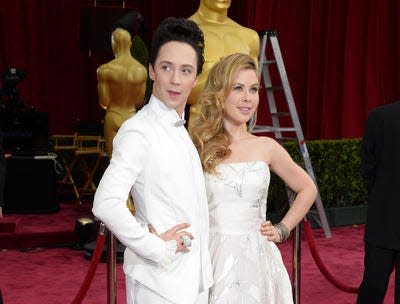
But behind the scenes, there's so much work and preparation that is involved for both Weir and Lipinski. That goes beyond their knowledge of the sport.
Lipinski, 40, trained briefly at the University of Delaware in the late 1990s. She won a World Championship in 1997 at the age of 15, and an Olympic gold medal in 1998 at 16. She was the youngest American ever to win gold in those competitions. Then she retired.
Lipinski and Weir always had the fearlessness to speak their minds.
That was never more apparent than last year when 15-year-old Russian skater Kamila Valieva was allowed to compete at the Olympics in Beijing after failing a drug test.
Weir and Lipinski remained silent during her short program as a sign of protest, then ripped the Russian federation for allowing her to skate.
When Valieva finished, Lipinski said: “We should not have seen this skate."
Weir added: "We are so sorry it is overshadowing your Olympics."
In the long program two days later, Valieva fell twice and finished fourth, failing to win a medal. To which Weir said on the air, "Thank God."
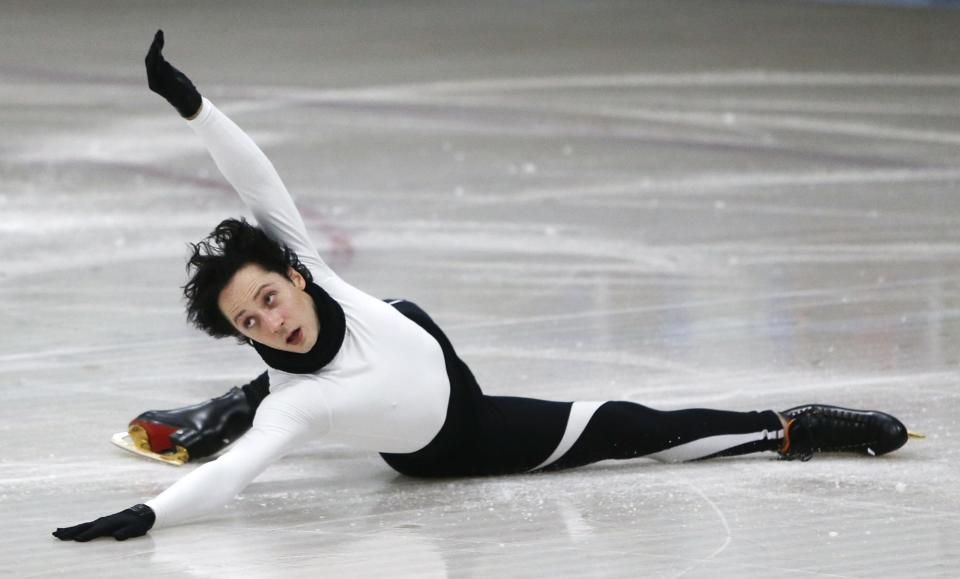
For Weir, this was a big deal that had lasting consequences. He had long been a fan favorite in Russia. He would go often to perform in events. He loved the people, the culture, and he became fluent in Russian.
Everything changed after his comments. Weir received threatening posts, written in Russian, on social media, and he had to unfriend many whom he had known for a long time. It was magnified even more just days after the Olympics concluded when Russia invaded Ukraine.
Weir vowed never to return to Russia while expressing his solidarity with the Ukranians.
"This war is hideous," he said. “As far as Russia is concerned, after the last Olympics, I felt that it would never be safe to visit Russia again. ... It was just the most heinous vile that I was getting, just for telling the truth by saying athletes caught doping should not be competing in the Olympics. So that made me a target anyway.
"And then when the war started and I obviously took the side of Ukraine … My heart is with Ukraine obviously.”
So much yet to come
The young man who first learned to skate on a lake has lived on the world stage for years. His final dance on the American stage comes this week.
He'll look around at the audience. He'll see his parents and his brother, and his brother's 2-year-old son. And he'll see the fans who turned him into an international star.
"Creep" and "Claire de Lune" will play, and Weir will cry.
"It’s kind of like me taking my last breath on the ice, and taking my last look around at an audience before I say goodbye," he said. "It’s glorious and sad and positive and happy, all at the same time."
If you go
2023 Spring Ice Show "Galaxy On Ice, Starring Johnny Weir"
Friday, March 31, and Saturday, April 1, both shows at 7 p.m.
Tickets are available at skatewilm.com or by calling 302-656-5005.
Contact Martin Frank at mfrank@delawareonline.com. Follow on Twitter @Mfranknfl.
This article originally appeared on Delaware News Journal: Olympic star Johnny Weir's goodbye to skating in Delaware performance

